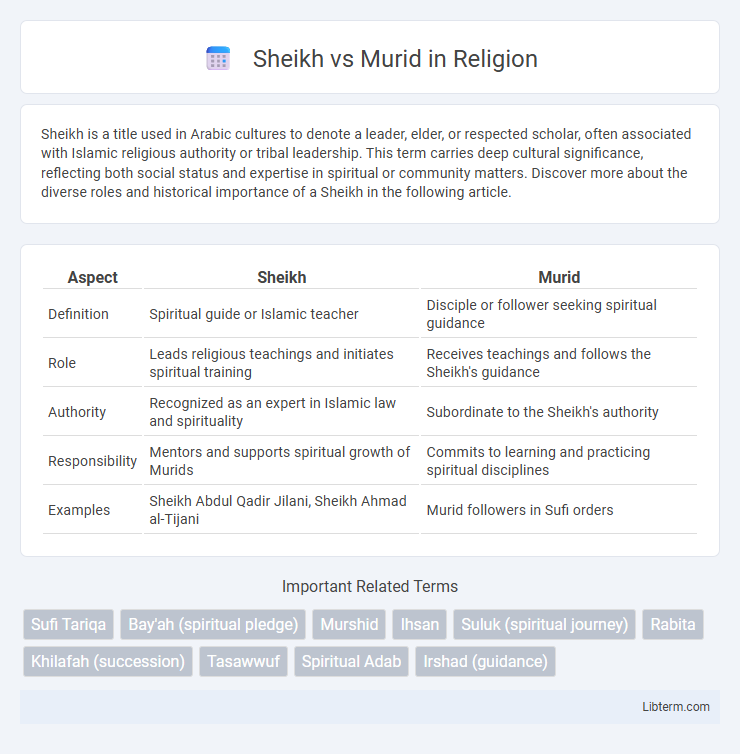Sheikh is a title used in Arabic cultures to denote a leader, elder, or respected scholar, often associated with Islamic religious authority or tribal leadership. This term carries deep cultural significance, reflecting both social status and expertise in spiritual or community matters. Discover more about the diverse roles and historical importance of a Sheikh in the following article.
Table of Comparison
| Aspect | Sheikh | Murid |
|---|---|---|
| Definition | Spiritual guide or Islamic teacher | Disciple or follower seeking spiritual guidance |
| Role | Leads religious teachings and initiates spiritual training | Receives teachings and follows the Sheikh's guidance |
| Authority | Recognized as an expert in Islamic law and spirituality | Subordinate to the Sheikh's authority |
| Responsibility | Mentors and supports spiritual growth of Murids | Commits to learning and practicing spiritual disciplines |
| Examples | Sheikh Abdul Qadir Jilani, Sheikh Ahmad al-Tijani | Murid followers in Sufi orders |
Understanding the Terms: Who Are Sheikhs and Murids?
Sheikhs are spiritual leaders or guides in Sufism, responsible for mentoring disciples and imparting esoteric knowledge. Murids are followers or disciples who pledge allegiance to a Sheikh, seeking spiritual growth and enlightenment through obedience and devotion. The relationship between Sheikh and Murid is foundational in Sufi practice, emphasizing guidance, trust, and inner transformation.
Historical Origins of Sheikh and Murid Roles
The historical origins of the Sheikh and Murid roles are deeply rooted in Islamic mysticism and Sufism, where the Sheikh serves as a spiritual guide and teacher imparting esoteric knowledge to disciples. The term "Sheikh" originates from Arabic, meaning elder or leader, signifying a figure of wisdom and authority within Sufi orders. Murids, derived from the Arabic word for "committed," are disciples or followers who seek spiritual enlightenment and discipline under the Sheikh's mentorship, primarily within the structure of Tariqas established since the early Islamic period.
Key Differences Between Sheikhs and Murids
Sheikhs are spiritual leaders or guides in Sufism, recognized for their deep knowledge of Islamic teachings and their role in mentoring disciples, while Murids are the devoted followers or disciples who seek spiritual growth under the Sheikh's guidance. Unlike Murids, Sheikhs possess the authority to interpret religious texts, initiate spiritual practices, and oversee the mystical journey of their disciples. The relationship between Sheikh and Murid is foundational to Sufi tradition, emphasizing transmission of esoteric knowledge and personal transformation.
The Role of a Sheikh in Sufism
A Sheikh in Sufism serves as a spiritual guide who leads disciples, known as Murids, on the path to inner purification and divine closeness through personalized teachings and practices. The Sheikh's role involves transmitting esoteric knowledge, overseeing ritual practices, and nurturing the Murid's spiritual development through mentorship and example. This relationship is foundational for achieving mystical realization and maintaining the integrity of Sufi orders (tariqas).
The Journey of a Murid: Path to Spiritual Enlightenment
A Murid embarks on a disciplined spiritual journey under the guidance of a Sheikh, whose wisdom and experience illuminate the path to enlightenment. This transformative process involves rigorous practices such as dhikr (remembrance of God), meditation, and adherence to ethical and moral teachings rooted in Sufism. The ultimate goal for the Murid is to achieve a state of spiritual unity and divine love, transcending ego and worldly attachments through the Sheikh's mentorship.
Spiritual Bond: The Relationship Between Sheikh and Murid
The spiritual bond between a Sheikh and Murid is foundational in Sufi traditions, emphasizing deep trust and guidance in the path of spiritual growth. A Sheikh serves as a spiritual mentor who imparts wisdom, teachings, and divine knowledge to the Murid, who commits to following the Sheikh's instructions with devotion and sincerity. This relationship fosters inner transformation, where the Murid seeks to attain closeness to God through the Sheikh's experienced guidance and blessings.
Initiation Process: Becoming a Murid
The initiation process to become a Murid involves a formal spiritual pledge known as Bay'ah, where the aspirant commits to following the guidance of a Sheikh in the Sufi path. This sacred bond requires the Sheikh to assess the Murid's readiness for spiritual discipline, which includes rigorous practices such as Dhikr (remembrance of God) and adherence to moral codes. The Sheikh imparts esoteric knowledge and mentorship, facilitating the Murid's transformation through stages of spiritual awakening and purification.
Responsibilities and Duties of a Sheikh
A Sheikh in Sufi tradition holds the key responsibilities of guiding Murids through spiritual development, interpreting sacred texts, and providing personalized instruction in meditation and ethical conduct. The Sheikh ensures the Murid adheres to the Tariqa's practices, maintains discipline, and progresses on the path of enlightenment. Serving as a spiritual mentor, the Sheikh also offers emotional support and resolves doubts, fostering a deep, transformative teacher-student relationship.
The Significance of Guidance in Sheikh-Murid Dynamics
The Sheikh-Murid relationship is central to Sufi traditions, emphasizing personalized spiritual guidance that fosters deep inner transformation. The Sheikh, as a spiritual mentor, provides tailored teachings, practices, and support essential for the Murid's progress on the mystical path. This dynamic highlights the importance of trust, loyalty, and continuous mentorship in achieving spiritual enlightenment and ethical development.
Modern Relevance of the Sheikh-Murid Tradition
The Sheikh-Murid tradition continues to shape contemporary Sufi practices by fostering deep spiritual mentorship and community cohesion. Modern digital platforms have expanded access to Sheikh guidance, allowing Murids worldwide to engage in personalized spiritual development. This enduring relationship supports mental well-being and ethical grounding amid the complexities of modern life.
Sheikh Infographic

 libterm.com
libterm.com